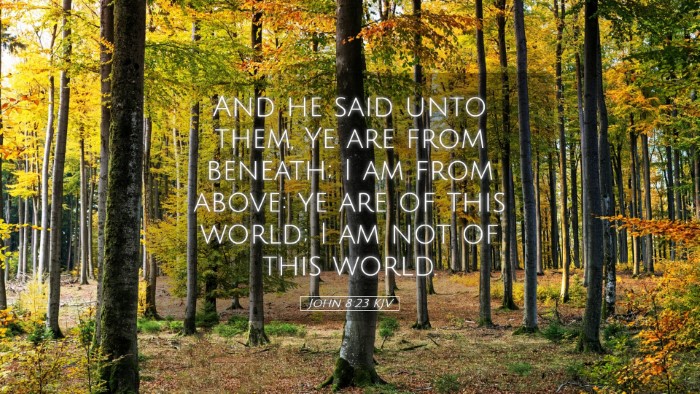Commentary on John 8:23
Verse Reference: John 8:23 - "And He said to them, 'You are from below; I am from above. You are of this world; I am not of this world.'
Contextual Overview
In this verse, Jesus is addressing the Pharisees in the temple. It is a pivotal point in the Gospel of John, where Jesus contrasts His divine origin and nature with that of His audience. This statement not only highlights His heavenly origin but also underscores the spiritual blindness of those who do not recognize Him as the Son of God.
Theological Insights
1. Distinction of Origin: Jesus emphatically points out the source of His existence, which is from above (divine origin) versus the earthly nature of the Pharisees and the people. This distinction is relevant in the understanding of Christology—Jesus as both fully divine and fully human.
2. Nature of Human Existence: By stating that His listeners are "of this world," Jesus indicates their spiritual status. Matthew Henry reflects on this by suggesting that worldly people are "earthly-minded" and cannot grasp spiritual truths without divine revelation.
3. Spiritual Blindness: Albert Barnes emphasizes the need for spiritual enlightenment to transcend the earthly perspective. The Pharisees were reliant on their own understandings and traditions, which blinded them to the true nature of Christ.
Historical Context
During this discourse, Jesus was confronting the religious leaders who held authority over Israel yet failed to recognize the Messiah. Adam Clarke notes that this conflict symbolizes the larger battle between divine truth and human tradition which often leads to spiritual stagnation.
Exegesis
The use of "below" and "above" in the context reveals a greater metaphysical reality where Jesus stands above human perception and experience. The phrase "not of this world" implies the transcendent nature of His mission and authority. The implications are profound for understanding the relationship between God and humanity.
Practical Applications
- Understanding Identity: Believers must grasp their identity in Christ, recognizing that their origin is aligned with the divine rather than merely worldly.
- Renewing the Mind: Followers of Christ are called to be transformed and not conformed to this world, leading to a deeper comprehension of spiritual matters.
- Witnessing to the Lost: We, like Jesus, must engage those who are spiritually blind, sharing the message of the gospel which opens eyes to the truth.
Conclusion
John 8:23 serves as a critical reminder of the difference between the divine nature of Christ and the human condition. Understanding this distinction fosters a deeper relationship with God and empowers believers to live in the light of truth. The insights gleaned from public domain commentaries not only provide historical and theological depth but also offer practical applications for spiritual growth and ministry.


